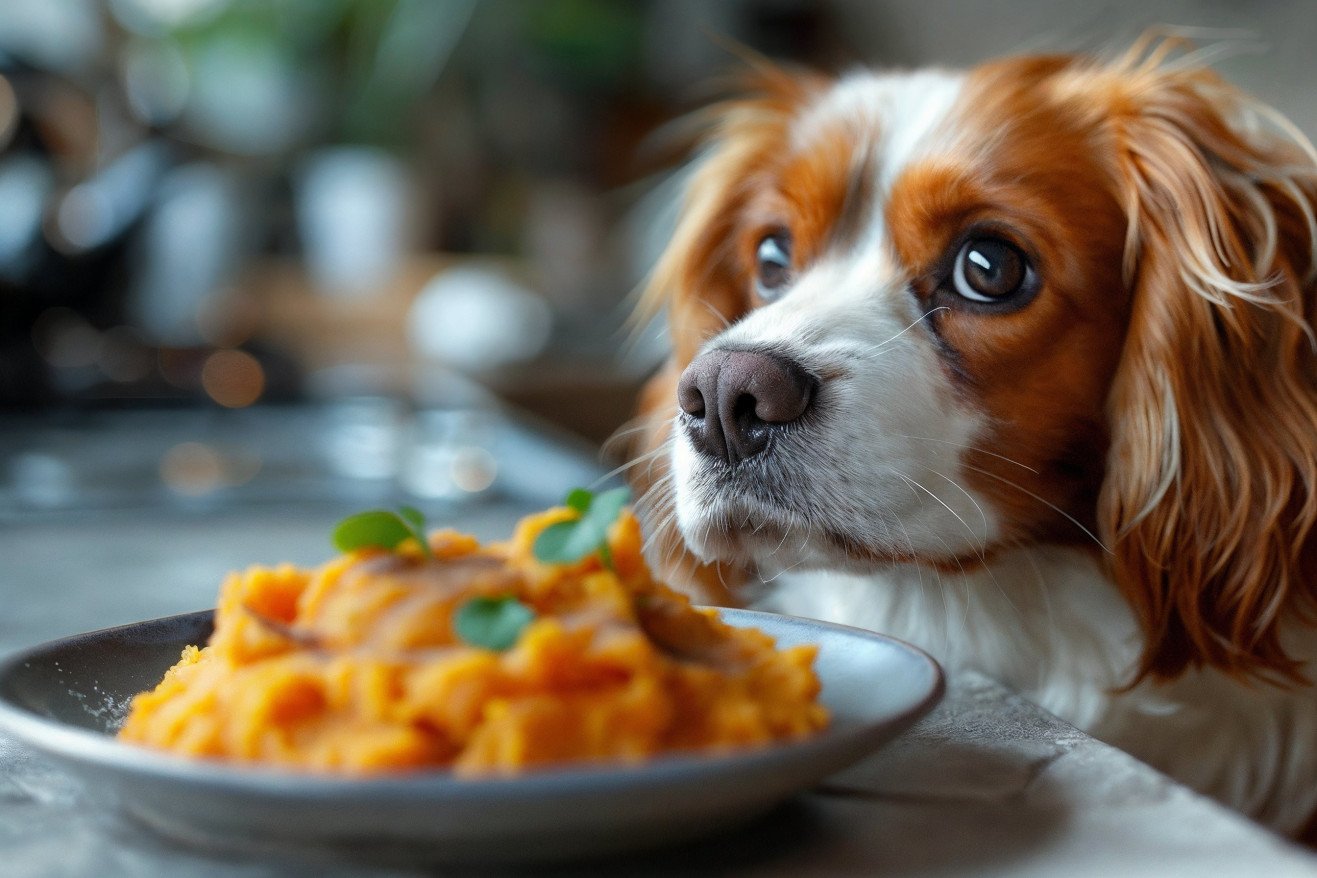Can Dogs Safely Enjoy Sweet Potatoes? Sweet Potato Safe Sharing
22 March 2024 • Updated 22 March 2024

If you follow a few simple rules, sweet potatoes can be a healthy and tasty addition to your dog’s diet - but there are some important caveats. Sweet potatoes need to be cooked and the skins need to be removed to ensure that they are easy to digest and free from any harmful pesticides or bacteria. After that, mash or cut them into small pieces and give them to your dog in moderation as an occasional treat to their regular meals.
Sweet potatoes have some great health benefits, including fiber, vitamins, and antioxidants, but they are also high in carbs and should not make up the majority of your dog’s daily calories. We will go over the best practices and things to avoid when adding sweet potatoes to your dog’s diet, including portion control, potential medication interactions, and how to tell if your dog is having a bad reaction to sweet potatoes.
How should sweet potatoes be prepared for dogs?
How to Prepare and Cook Sweet Potatoes
Proper preparation is key when feeding sweet potatoes to your dog. Always wash them thoroughly before cooking to remove any dirt, debris or pesticide residue. Then peel the skins, as they can be difficult for dogs to digest.
The recommended cooking methods are boiling, baking and steaming. For boiling, cut the potatoes into bite-sized pieces, cover with water and boil for 15-20 minutes until soft. To bake, preheat oven to 400°F, prick a few holes and bake for 45-60 minutes until tender. For steaming, cut into cubes, place in a steamer basket and steam for 15-20 minutes.
Regardless of the method you choose, make sure the sweet potatoes are completely cooled before giving them to your dog to avoid burns or other mouth injuries. By following these steps, you can make sure your dog can safely enjoy the health benefits of sweet potatoes.
How Much Sweet Potato Can Dogs Have?
While sweet potatoes can be a healthy addition to your dog's diet, it's important to practice portion control and avoid letting them make up a large part of your dog's daily calories. According to BetterVet, sweet potatoes should make up no more than 10% of your dog's daily caloric intake and should be used as a supplement, not a staple, in their diet.
The American Kennel Club suggests serving sizes ranging from 1 to 6 tablespoons a day, depending on your dog's size and weight. Overconsumption of sweet potatoes can lead to weight gain, gastrointestinal upset, and, in the case of diabetic dogs, spikes in blood sugar.
If you're giving your dog sweet potatoes for the first time, you should start with a small amount and observe how your dog responds. Daily Paws recommends gradually introducing sweet potatoes into your dog's diet to make sure they don't have a bad reaction. It's also a good idea to talk to your vet, especially if your dog has any health issues.
Sweet Potatoes for Dogs with Certain Health Issues
Dogs with certain health issues may need to limit or avoid sweet potatoes. As stated by BetterVet, dogs with diabetes or weight management concerns may need to avoid sweet potatoes because they are high in carbohydrates and sugar.
That said, for dogs with kidney disease, homemade meals that include sweet potatoes can be a good option if they are created by a veterinary nutritionist. Per Chi Dog, a carefully planned diet that includes sweet potatoes can help control the disease and improve the dog's quality of life.
Meanwhile, dogs with sensitive stomachs or digestive problems may find relief in the fiber that sweet potatoes provide. Thriving Doggo suggests introducing sweet potatoes in small amounts and watching for any negative side effects. It's important to talk to a vet before making any major changes to a dog's diet, especially if they have an existing health condition.
Sweet Potato Dog Chews and Treats
Dehydrated or baked sweet potato slices can be used as a healthy and long-lasting dog chew that's a good alternative to rawhide. According to It Doesn't Taste Like Chicken, you can make your own sweet potato dog chews by slicing sweet potatoes into 1/4-inch coins and baking them at 250°F for 2.5-3 hours, flipping them halfway through, until they're dried out and chewy. Three Little Chickpeas suggests slicing the sweet potatoes 1/2 cm thick and baking them at 250°F for 2.5-3 hours, checking them after 2.5 hours to see if they've reached the desired level of crispness.
In addition to helping keep your dog's teeth clean, these homemade sweet potato chews can also serve as a low-calorie treat for your dog. According to The Wildest, sweet potato chews are a safer alternative to rawhide chews because they don't pose the same risk of digestive blockages or choking.
That said, Blue Ridge Naturals warns against giving dogs fried, salted, or seasoned sweet potato products, such as sweet potato fries or chips, since these can be unhealthy for dogs. As with any new treat, especially one that's high in fiber, start with a small amount of sweet potato and watch for any signs of digestive upset or allergic reactions.
Conclusion: What to Know About Feeding Sweet Potatoes to Dogs
If you prepare and feed them correctly, sweet potatoes can be a healthy and tasty treat for your dog. However, it's important to remember to cook them thoroughly, remove the skin, and feed them in moderation as an occasional addition to a complete and balanced diet. This is especially important because sweet potatoes are high in carbohydrates and should not be a major part of a dog's daily caloric intake.
Although sweet potatoes have a number of health benefits, including fiber, vitamins, and antioxidants, they may not be appropriate for dogs with certain health issues, such as diabetes or kidney disease. As a result, it's important to talk to your vet before you make any significant changes to your dog's diet, especially if your dog has a health condition.
In the end, sweet potatoes can be a healthy part of your dog's diet as long as you introduce them slowly and feed them in the right amounts. By doing so, you can make sure that you're adding this nutritious root vegetable to your dog's diet in a way that's safe.


